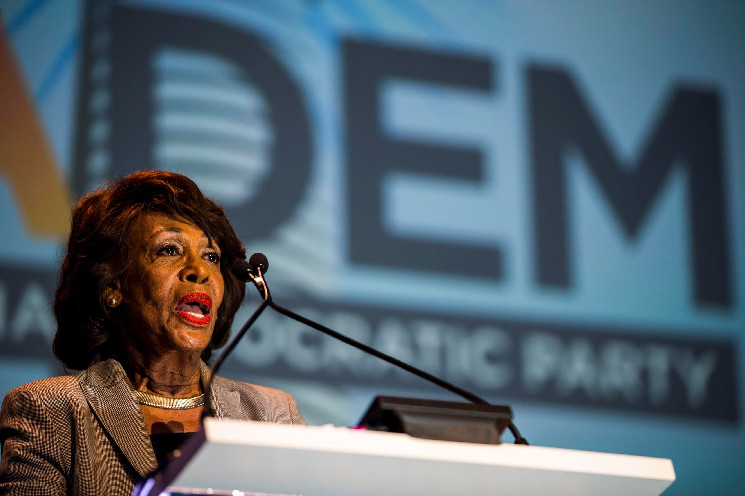U.S. Representative Maxine Waters (CA-D), a formidable force in U.S. politics, has long been a key figure in the financial regulation landscape. As the former Chair of the House Financial Services Committee (HFS) and the current ranking member, Waters is known for her cautious and critical approach to cryptocurrency, often emphasizing the need for strict regulation to protect consumers and maintain financial stability. In the wake of the 2022 crypto contagion season marked by the FTX scandal, a crypto bear market and several industry bankruptcies, Waters called for greater scrutiny and control by regulators and Congressional oversight committees.
However, this week in a August 21st appearance on the Our Native Land podcast during the 2024 Democratic National Convention in Chicago, IL., hosted by Angela Rye, Tiffany Cross, and Andrew Gillum (with special guest Charlamagne Tha God), Waters signaled an evolution in her perspective. She explained that if Democrats regain control of the House and she resumes her role as Chair of the HFS committee, one of her top three priorities would be fostering innovation in artificial intelligence, cryptocurrency, and other emerging technologies.
“We’ve got to move forward with AI, artificial intelligence, [and] cryptocurrency,” explained Waters in response to Gillum’s question regarding legislative priorities in a Democrat-led House of Representatives.
These statements mark a turning point in Waters’ position and represent a notable departure from her earlier, more critical approach.
Waters’ Crypto Skeptic Past
Waters has consistently demonstrated a cautious and critical approach toward cryptocurrency. This was evident in several key instances where she took decisive actions to curb what she perceived as the risks posed by the rapidly growing, volatile crypto asset market.
In June 2019, Waters took a firm stance against Facebook’s proposed cryptocurrency, the Libra stablecoin (later renamed Diem). Just hours after Facebook unveiled Libra, Waters requested that the company pause its development of the digital currency. She expressed significant concerns about Facebook’s past behavior, particularly regarding data privacy and security, and highlighted the lack of a clear regulatory framework to protect investors and consumers in the cryptocurrency market.
At the hearing, which I attended, Waters called for a moratorium on the development of Libra until Congress and regulators had the opportunity to thoroughly examine the project and its potential risks. This action underscored her deep skepticism about the role of large tech companies in the financial space and her commitment to ensuring robust regulatory oversight.
In December 2020, Waters further solidified her position by urging then President-elect Joe Biden to rescind or closely monitor all cryptocurrency-related guidance issued by the Office of the Comptroller of the Currency (OCC) under then Acting Comptroller Brian Brooks. Waters was particularly concerned about the OCC’s guidance allowing national banks to hold stablecoin reserves and to provide cryptocurrency custody services. She viewed these actions as part of a broader effort by the Trump administration to loosen regulations on the financial sector, potentially to the detriment of consumer protection and financial stability.
In June 2021, Waters announced the formation of a Democratic House Working Group to evaluate cryptocurrencies. This group was tasked with engaging regulators and experts to better understand the implications of the growing crypto industry, particularly in light of incidents like the Colonial Pipeline cyberattack, where bitcoin was used to pay a ransom. Waters’ establishment of this working group further highlighted her cautious approach, focusing on the need for thorough oversight and regulation.
A New Direction: Pro-Web3 Economy
Waters’ legislative focus aligns with recent statements from other members of Congress, including Senators Chuck Schumer (D-NY), Kirsten Gillibrand (D-NY) and Debbie Stabenow (D-MI), and Representatives Adam Schiff (D-CA), and Wiley Nickel (D-NC), who strongly support bipartisan efforts to pass reasonable crypto regulation. During a “Crypto4Harris” town hall, Schumer expressed optimism about passing a bipartisan crypto bill before the year’s end, marking a significant departure from the previously skeptical stance of many Democrats.
Democratic presidential candidate Kamala Harris will also support policy efforts to encourage the growth of the cryptocurrency industry, one of her top campaign officials said Wednesday, signaling a departure from the current administration’s open hostility and declared war on crypto. “She’s going to support policies that ensure that emerging technologies and that sort of industry can continue to grow,” said Brian Nelson, senior advisor for policy for the Harris campaign, during a Bloomberg roundtable at the Democratic National Convention in Chicago. Waters’ turnabout, along with Harris’ campaign statements, indicates growing support for policies that foster the growth of the cryptocurrency industry, suggesting a more favorable regulatory environment under a potential Harris administration.
This shift also suggests that Waters, along with other Democrats, recognizes the transformative potential of these technologies and the importance of ensuring that the U.S. remains competitive in the global digital economy. A pro-innovation stance aligns with a broader vision of economic inclusion and empowerment, particularly as the U.S. seeks to lead in the Fourth Industrial Revolution—a period powered by rapid technological advancement and the integration of digital, physical, and biological systems.
Pro-Crypto Agenda Could Benefit Consumers and the Economy
Waters’ new stance could have significant implications for the U.S. cryptocurrency industry. A pro-innovation approach from a key figure and skeptic like Waters might lead to more supportive regulatory frameworks that encourage the growth of the cryptocurrency market while still maintaining necessary consumer protections. This shift could pave the way for increased adoption of digital assets and greater integration of blockchain technology into the broader financial system.
For American consumers, this change could mean greater access to financial tools that promote wealth-building and financial sovereignty, particularly for communities historically marginalized by traditional financial systems. Cryptocurrencies offer a decentralized alternative to traditional finance, providing opportunities for economic empowerment, especially for Black and Latino communities that have faced systemic barriers to wealth-building. By embracing these technologies, as I explained in my 2023 testimony before the HFS Subcommittee on Digital Assets, the U.S. can foster a more inclusive economy where anyone with an internet connection and a digital wallet can participate, bypassing traditional and predatory gatekeepers and leveling the economic playing field.
Moreover, Waters’ emphasis on learning and adapting to new technologies could signal a more collaborative relationship between regulators and the cryptocurrency industry. This might involve creating clearer regulatory guidelines that provide the industry with the certainty it needs to innovate and grow within the U.S., rather than being driven offshore by regulatory ambiguity. In turn, this could enhance the U.S.’s position as a global leader in the Web3 economy, ensuring it remains at the forefront of technological innovation and economic growth.
Back to the Future
Waters’ recent comments mark a significant departure from her previous cautionary stance on cryptocurrency and suggest an acknowledgement that bitcoin and other cryptocurrencies are here to stay. As she positions herself for a potential return to leadership in the House Financial Services Committee, her reimagined agenda could be a catalyst for a new era of cryptocurrency regulation in the U.S.—one that better balances the need for security and consumer protection with the imperative to foster technological advancement. The potential benefits of this shift are profound: it could promote economic inclusion, empower American consumers, and solidify the U.S.’s role as a leader in the digital economy. The cryptocurrency industry, policymakers, and stakeholders will be closely watching how this evolution unfolds and what it means for the future of crypto assets and blockchain technology in America.
Read the full article here









